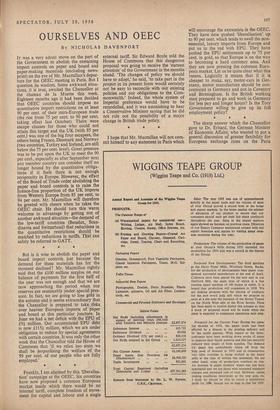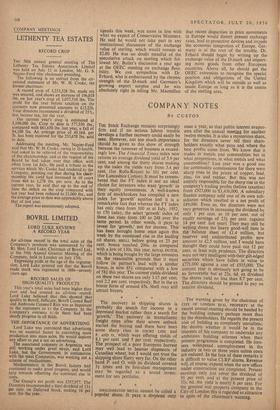OURSELVES AND OEEC
By NICHOLAS DAVENPORT
IT was a very adroit move on the part of the Government to abolish the remaining import controls on paper and board and paper-making materials (excluding news- print) on the eve of Mr. Macmillan's depar- ture for the OEEC meeting in Paris. But I question its wisdom. Some awkward situa- tions, it is true, awaited the Chancellor at the chateau de la Muette this week. Eighteen months ago it had been decided that OEEC countries should impose no quantitative import restrictions on at least 90 per cent, of their intra-European trade (the rise from 75 per cent. to 90 per cent. taking effect last October). There were escape clauses for those who could not attain this target and the UK (with 85 per cent.) was one of the big four escapees, the others being France, Denmark and Norway (two countries, Turkey and Iceland, are still below the 75 per cent. level). Great pressure was to be put upon the UK to meet the 90 per cent., especially as after September next any member country can consider itself no longer bound by the quantitative obliga- tions if it feels there is not enough reciprocity in Europe. However, the effect of the Board of Trade order abolishing the paper and board controls is to raise the licence-free proportion of the UK imports from Western Europe from 85 per cent. to 94 per cent. Mr. Macmillan will therefore be greeted with cheers when he takes the OEEC chair. He should turn this warm welcome to advantage by getting out of another awkward situation—the demand of the low-tariff countries (Benelux, Scan- dinavia and Switzerland) that reductions in the quantitative restrictions should be matched by reductions in tariffs. That can safely be referred to GATT.
But is it wise to abolish the paper and board import controls just because the demand for these materials has for the moment declined? Mr. Macmillan rightly said that the £100 million surplus on our balance of payments for the first half of the year was not enough and that we are now approaching the period when our reserves are seasonably under special pres- sure. In fact, we are going to lose gold in the autumn and it seems extraordinary that the Chancellor is prepared to take risks over heavier European imports of paper and board at this particular juncture. In June we had a net deficit with the EPU of Of million. Our accumulated EPU debt is now £l15+ million, which we are under obligation to reduce by special agreements with certain countries. It was only the other week that the Chancellor told the House of Commons that 'if we relax too soon we shall be jeopardising the welfare of the 99 per cent, of our people who are fully employed.'
Frankly, I am alarmed by this 'liberalisa- tion' campaign at the OEEC. Six countries have now proposed a common European market inside which there would be no internal tariff, complete freedom of move- ment for capital and labour and a single external tariff. Sir Edward Boyle told the House of Commons that this dangerous proposal was going to receive the 'earnest attention' of the Government in the months ahead. The changes of policy we should have to adopt,' he said, 'to take part in the project in its present form would certainly not be easy to reconcile with our existing policies and our obligations to the Com- monwealth.' Indeed, the whole system of Imperial preference would have to be remodelled, and it was astonishing to hear a Conservative Minister saying that he did not rule out the possibility of a major change in British trade policy.
I hope that Mr. Macmillan will not com- mit himself to any statement in Paris which will encourage the extremists in the OEEC. They have now pushed 'liberalisation', up to 90 per cent, which tends to swell the non- essential, luxury imports from Europe and put us in the red with EPU. They have pushed the EPU settlements up to 75 per cent, in gold, so that Europe is on the way to becoming a hard currency area. And they are now pressing the common Euro- pean market. Let us be quite clear what this means. Logically it means that if it is cheaper to make, say, motor-cars in Ger- many, motor manufacture should be con- centrated in Germany and not in Coventry and Birmingham. Is the British working man prepared to go and work in Germany for less pay and longer hours? Is the Tory Government willing to give up its full employment policy?
The sharp answer which the Chancellor gave to Dr. Erhard, the German Minister of Economic Affairs, who wanted to put a general discussion of greater flexibility for European exchange rates on the Paris agenda this week, was more in line with what we expect of Conservative Ministers. He said he would not take part in any international discussion of the exchange value of sterling, which would remain at $2.80. He was no doubt mindful of the speculative attack on sterling which fol- lowed Mr. Butler's discussion a year ago at the ()EEC meeting on exchange flexi- bility. We can sympathise with Dr. Erhard, who is embarrassed by the chronic strength of the D-mark and Germany's growing export surplus and he was absolutely right in telling Mr. Macmillan that recent disparities in price movements in Europe would distort present exchange rates, lead to protective devices and impede the economic integration of Europe. Ger- many is at the root of the trouble. Dr. Erhard should begin by writing up the exchange value of the D-mark and import- ing more goods from other European countries. Above all, he should get the OEEC extremists to recognise the special position and obligations of the United Kingdom which will be outside as well as inside Europe as long as it is the centre of the sterling area.



















































 Previous page
Previous page